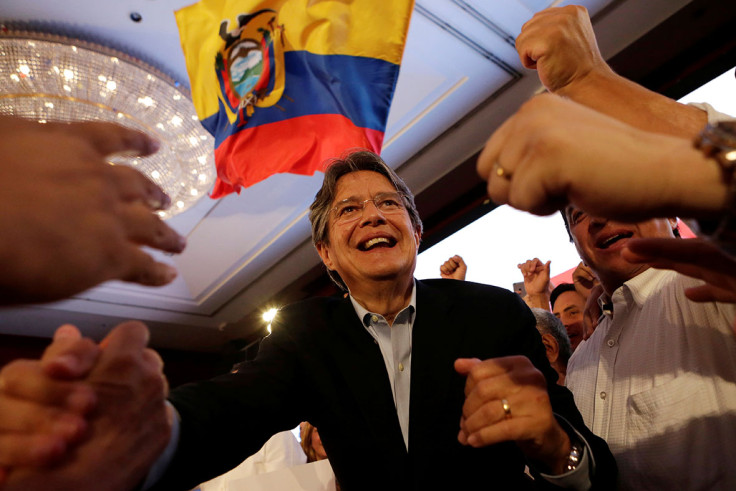WikiLeaks' Julian Assange faces uncertainty as Ecuador presidential elections head for run-off
Challenger Guillermo Lasso has promised to cut taxes and evict Assange from the Ecuadorian embassy in London.

Presidential elections in Ecuador look set to proceed to a run-off between the two candidates with the highest percentage of the vote, prolonging the uncertainty over the future of Ecuador's notorious political refugee, WikiLeaks founder Julian Assange.
With around 89% of the ballots cast on 19 February counted, the National Electoral Council shows ruling socialist party candidate Lenin Moreno leads the vote with 39.1%, just short of the 40% majority he would have needed for an outright win.
Moreno is a well-known activist for the rights of people with disability. He has been in a wheelchair since he was shot in a robbery in 1998 and has been leading in the polls since the elections were first announced in November.
His main rival is former banker Guillermo Lasso, who is predicted to win around 28.3% of the vote and was celebrating the result last night. Moreno's victory in the second round would be all but assured as opposition forces are expected to rally behind Lasso.
Along with the promise to cut taxes, reduce government spending and increase employment, Lasso also said he would evict Assange from the Ecuadorian embassy in London, where the Australian has been offered political asylum for the past five years to avoid extradition to Sweden where is accused of rape.
Assange was closely following the elections result via Twitter, explaining that if Lenin did not manage to reach 40% of the vote, he was likely going to lose in the next round. But he also seemed to find reassurance in the majority of exit polls giving Moreno a victory within the first round. "4/5 exit polls say that the candidate promising to uphold my asylum, Lenin Moreno, has won. Will know for sure in hours," he wrote on 19 February.
Ecuadorian election today. 4/5 exit polls say that the candidate promising to uphold my asylum @Lenin has won. Will know for sure in hours.
— Julian Assange (@JulianAssange) February 19, 2017
The possibility of eviction clearly worries Assange and his supporters, as WikiLeaks launched the hashtag meaning "the world with Assange" (#ElMundoConAssange, in Spanish) to demand his protection. While Moreno may not be opposed in principle to continue supporting Assange, in practice the deteriorating economic position of the country may force the future government to cut on expenses.
In an interview with the Guardian newspaper, the country's current foreign minister Guillaume Long mentioned a human cost associated with Assange's asylum and wished for a swift resolution of the ongoing issues. "We would like the next step to be tomorrow. We hope they are as swift as possible, because this has been going on for far too long," he said.
According to Michael Shifter, president of the Inter-American Dialogue in Washington, it is only a matter of time before Assange is shown the door. "Even if Moreno wins, Ecuador will figure out a solution that sees Assange out of the embassy in the next presidential term," he told the Washington Post. "Lasso is saying 30 days. With Moreno, maybe it would be more like a year or two."
In the vote held on Sunday, Ecuadorians were also asked to take part in a referendum championed by outgoing president Rafael Correa on banning politicians and civil servants from holding wealth in tax havens. The preliminary results showed a decisive support for the proposal, winning a projected majority of 54.6%.
Both the Ecuadorian National Electoral Council officials and international observers confirmed that the election was fair and transparent.
© Copyright IBTimes 2025. All rights reserved.






















